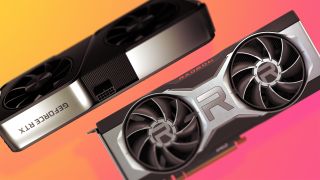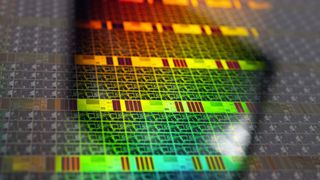Intel and TSMC CEO's needle each other over US based chipmaking
The pressure behind the scenes is ramping up.

The world of chipmaking is a complex one. It’s clear the pressure is building from everyone including gamers hoping to grab affordable GPUs to big tech CEOs to politicking politicians. Discussions involving billions of dollars’ worth of contracts are usually kept in house, but that hasn’t stopped Intel CEO Pat Gelsinger and TSMC chairman Mark Liu from getting into a rare public spat over little things like geopolitical instability and national security.

How to buy a graphics card: tips on buying a graphics card in the barren silicon landscape that is 2021
Firstly, a bit of background. US lawmakers are working on passing legislation known as the CHIPS for America Act and the FABS Act. These bills aim to shore up USA based semiconductor R&D and manufacturing. Discussions have cited national security as a primary concern. The US Senate passed funding for the CHIPS act in June 2021, but since then discussions have stalled in the House of Representatives. The CEOs of Apple, Intel, Nvidia and AMD among many others have signed an open letter addressed to Congress pushing it to pass the legislation. These calls for action will only get louder.
As reported by Bloomberg and the Taipei Times, last week, Intel CEO Pat Gelsinger spoke at the Fortune Brainstorm Tech summit in California, saying that the US government should support a sustainable semiconductor supply chain in the US, in part because “Taiwan is not a stable place.” No doubt that comment raised a few eyebrows among the attendees.
He’s got a point. China continues to flex its muscles across the region. It regularly sends military aircraft into Taiwanese airspace and there are concerns that further disruptions to global semiconductor supply issues could be catastrophic to the fragile global economy, not to mention Intel’s bottom line. Additionally, as someone who has experienced a Taiwanese earthquake, I often wonder how secure fab facilities really are!
TSMC’s chairman, Mark Liu delivered a rare public rebuke. When asked about Gelsinger’s comments, Liu said: “There’s nothing that needs to be addressed.” Before following up with “Not too many people will believe what Intel says.” A comment like that aimed at a customer would be unusual but it’s even more so coming from a Taiwanese business leader, where business culture is firmly based on respect.
For its part, TSMC is building a $12 billion facility in Arizona, with the aim of commencing volume production of 5nm chips in 2024. This fab will be joined by Samsung’s $17 billion facility in Texas so its clear that investment in USA based manufacturing is ramping up.

But, problems won't be fully solved no matter if they are made in the USA or Taiwan or China. A typical chip contains chemicals and rare earth metals sourced from all over the world, a shortage in any of them can dramatically affect production. A chip may be diffused in Taiwan before being attached to a substrate made in China or a PCB in Malaysia before being assembled somewhere else. Add in shipping delays, tariffs and protectionism and the sheer expense of semiconductor manufacturing and it becomes obvious that the key players in the game will have a lot more to say on these issues over the coming months, weeks and years. Companies such as Intel and TSMC may be beginning to feel the pressure. Now, where are those affordable GPUs?
The biggest gaming news, reviews and hardware deals
Keep up to date with the most important stories and the best deals, as picked by the PC Gamer team.

Chris' gaming experiences go back to the mid-nineties when he conned his parents into buying an 'educational PC' that was conveniently overpowered to play Doom and Tie Fighter. He developed a love of extreme overclocking that destroyed his savings despite the cheaper hardware on offer via his job at a PC store. To afford more LN2 he began moonlighting as a reviewer for VR-Zone before jumping the fence to work for MSI Australia. Since then, he's gone back to journalism, enthusiastically reviewing the latest and greatest components for PC & Tech Authority, PC Powerplay and currently Australian Personal Computer magazine and PC Gamer. Chris still puts far too many hours into Borderlands 3, always striving to become a more efficient killer.
Most Popular






